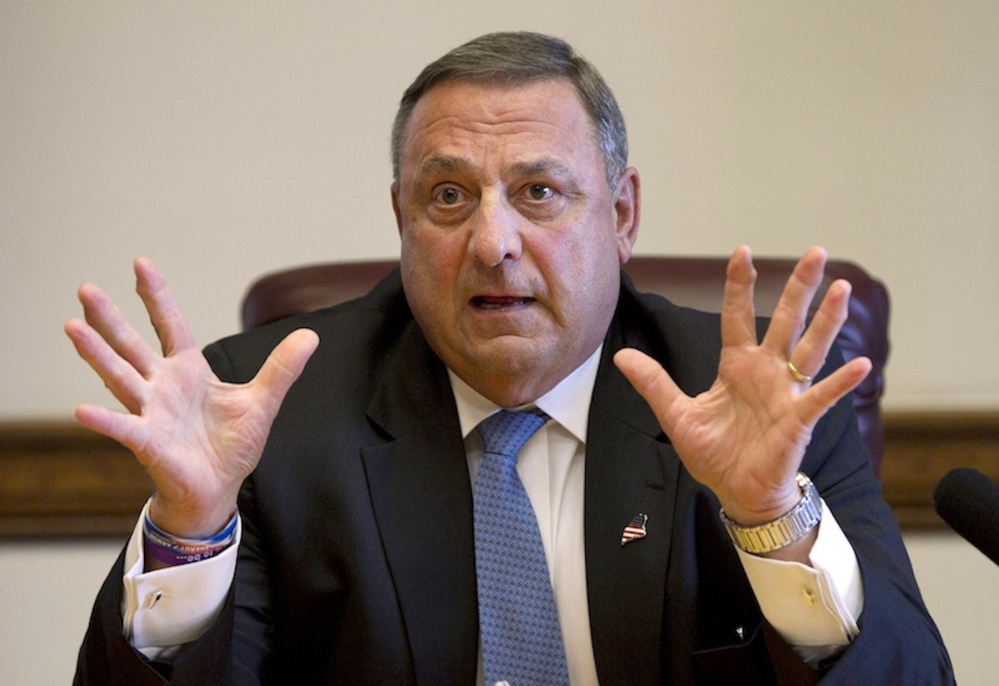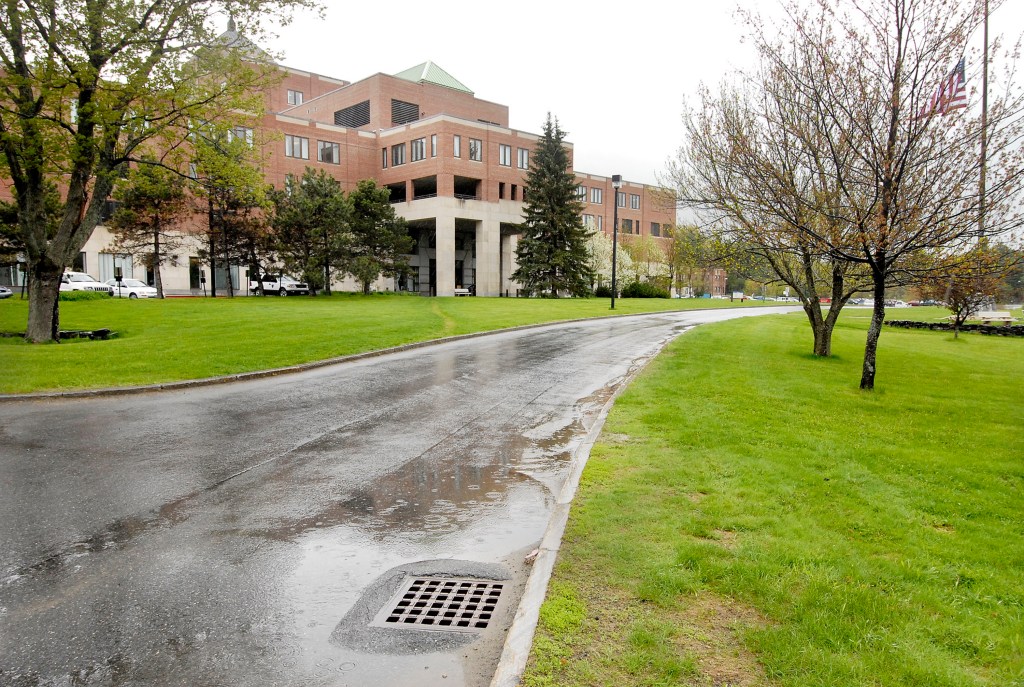Six Republican governors, including Maine’s Paul LePage, have asked the federal government for authority to investigate Department of Veterans Affairs facilities in their states, citing the scandal over the treatment of veterans at a VA hospital in Phoenix who were put on a secret waiting list for health care.
The letter, dated Tuesday, was sent to President Obama and signed by LePage and Govs. Rick Scott of Florida, Sam Brownback of Kansas, Bobby Jindal of Louisiana, Tom Corbett of Pennsylvania and Rick Perry of Texas.
The governors’ request seeks unprecedented permission for states to exercise authority over federal facilities and the practices of federal personnel. Scott said Wednesday that he will pursue a lawsuit against the Department of Veterans Affairs for the authority to inspect the state’s hospitals.
“Reports from states around the country of wait times in a system manipulated by VA leaders to hide the growing problems are not only inexcusable, they demand your immediate and full attention,” the letter said. “Given the claims that high-ranking VA officials, including former Secretary (Eric) Shinseki, were unaware of the critical nature and scope of the problems at VA hospitals throughout the country, it is clear that a system for significant oversight is nonexistent.”
No major problems have been reported in Maine’s VA system, and wait times for care have been in line with federal standards.
Shinseki resigned in light of the scandal in Phoenix, which led to scrutiny of veterans’ health-care systems nationwide. Twenty-six VA hospitals are now under investigation for allegations of long waits and delays in treatment.
The six governors urged the president to suspend a VA bonus system that rewards managers for meeting performance goals, including giving veterans care within 14 days of requests for appointments. They also asked that veterans get federal vouchers to seek care elsewhere if they cannot get it from a VA facility within 30 days.
MAINER SAYS SYSTEM IS INEFFICIENT
The voucher system, and a closer watch on the system as a whole, resonated with at least one veteran, Randall Simonse, adjutant at Amvets Post 2 in Yarmouth.
Simonse said he has had trouble getting the VA in Maine to respond to requests for repayment of recent medical transportation costs. He said it would be easier for the farthest-flung veterans to use vouchers to get care closer to home.
“There’s just got to be a more cost-effective way to deliver health care to veterans,” he said.
The fact that LePage got in front of the issue didn’t seem politically motivated to him. “There’s a lot of chest-beating going on in all fronts,” he said, but “his gruff exterior aside, I think (LePage) is a good advocate for veterans.”
LePage’s office did not respond to requests for comment Wednesday about whether he knows of problems at VA facilities in Maine that have not been reported.
State veterans groups and U.S. Rep. Mike Michaud, D-Maine, the ranking Democrat on the House Veterans’ Affairs Committee, have said no problems have been reported at the Togus VA Medical Center in the Augusta area.
Since the VA scandal erupted, LePage and independent candidate for governor Eliot Cutler have been highly critical of Michaud, who also is running for governor. Michaud has defended his work on the veterans’ affairs committee, saying its oversight process is working.
Michaud has called on Obama to act, and has submitted a bill in the Republican-controlled House that’s designed to increase accountability in the VA, while removing civil service protections for 80,000 VA employees, making it easier to fire them. The bill awaits action by the Senate.
SUSPICIONS OF POLITICAL MOTIVE
Of the six governors who signed the letter, four are running for re-election. Three of the four – LePage, Corbett and Scott – have been identified as holding hotly contested and vulnerable gubernatorial seats.
As a political tool, the letter accomplished the dual purpose of keeping pressure on Obama while advancing the Republican Party’s opposition to the president. In Maine, the letter also emphasizes the idea that states are better equipped to handle such affairs, said Ronald Schmidt Jr., a political science professor at the University of Southern Maine.
Schmidt said the letter highlights a contrast between LePage’s position on veterans affairs and Michaud’s record.
“As a political scientist, I try to not sound partisan in response to press questions, but it’s hard to not see this as skeezy,” Schmidt said. “It’s a serious enough issue nationally that the ‘me-too’ aspect is a little distasteful.”
Kyle Kondik, a staffer at the University of Virginia Center for Politics and the managing editor of Sabato’s Crystal Ball, a well-regarded political magazine, said the letter is about politics, pure and simple.
“The White House really wanted to get the VA thing out of the news, and the Republicans wanted to keep it in the news,” Kondik said. “I think that’s why these letters get sent. I think it’s about positioning and politics.”
VA DATA: TOGUS MEETS STANDARDS
According to a Department of Veterans Affairs database comparing VA hospitals around the country on several measures, including safety and effectiveness, Togus falls within the department’s national standards.
No information was available from the database on Togus’ performance in timeliness of outpatient care, but spokesman James Doherty said two weeks ago that in fiscal year 2013, more than 98 percent of established primary-care patients – those treated at the hospital previously – got appointments within 14 days of requesting them.
The average wait time for new patients, about 10 percent of the total, grew from 24 days in 2012 to 30 in 2013, Doherty said.
The VA’s Office of Inspector General has widened its probe to VA clinics nationwide, to determine whether staff members purposely omitted the names of veterans who sought treatment, and whether any deaths were caused by delayed care.
An interim report released by the office said 1,700 veterans awaiting care in Phoenix were not on the official electronic waiting list. Until a veteran gets on the list, the clock recording the wait time – one factor in employees’ awards and salary increases – does not start.
The Office of Inspector General looked at incidents involving 266 veterans in Phoenix and found that 84 percent waited more than two weeks for an appointment, about twice the number reported by VA officials. It also found that veterans, on average, waited 115 days for an appointment – nearly five times the 24 days reported by officials.
The interim report recommends immediate action, such as providing appropriate health care to the 1,700 veterans who are not on any waiting list, prioritizing those who are at the greatest medical risk.
Matt Byrne can be contacted at 791-6303 or at:
mbyrne@pressherald.com
Twitter: MattByrnePPH
Send questions/comments to the editors.





Success. Please wait for the page to reload. If the page does not reload within 5 seconds, please refresh the page.
Enter your email and password to access comments.
Hi, to comment on stories you must . This profile is in addition to your subscription and website login.
Already have a commenting profile? .
Invalid username/password.
Please check your email to confirm and complete your registration.
Only subscribers are eligible to post comments. Please subscribe or login first for digital access. Here’s why.
Use the form below to reset your password. When you've submitted your account email, we will send an email with a reset code.